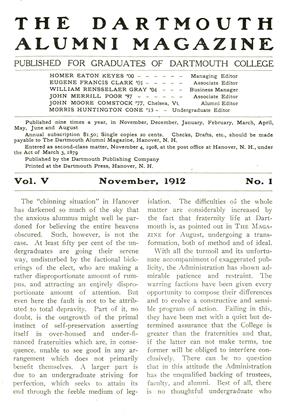The second of the new era of Dartmouth Nights was held in Webster Hall on the night of October 4. Just as last year a train load of alumni came up from Boston to attend the exercises, so this year the various New Hampshire organizations united for the occasion and just before the opening address, marched two hundred strong into the hall. They received a rousing welcome there, but it was not the first with which they had been greeted. The entire undergraduate body had been at the Norwich station some hours before and there had patiently awaited the arrival of the special train with its delegation of alumni.
The train once in there had been cheers; the college band had struck up a march and, with indomitable courage playing and climbing, had led visitors and undergraduate escort up the hill, across the campus, illuminated with green fire; past the old row, shining in necklaced glory of electric lights, and thence to President Nichols' home for a preliminary word of official welcome.
That had been a pretty fair beginning for the evening. It put everybody in happy and expectant mood for the exercises proper. These were briefly opened by President Nichols, who declaring the occasion one for celebrating the essential Dartmouth Spirit, introduced Judge David Cross '41.
Perennially young, perennially enthusiastic Judge Cross ran his eloquent course from tears to laughter and back again to tears. Addressing himself particularly to the freshmen he gave them encouragement and sage advice, mingled with shrewd reflection, and apt illustrations drawn from the experience of nearly a century. He was heard with the absorbed attention due him as a remarkable public speaker. When he had finished he received again, as he had at the moment of his introduction, a spontaneous and long-continued ovation.
Professor Laycock was next called upon to read messages that had come pouring in from alumni associations the country over; for it has become a growing custom for distant alumni associations to meet on Dartmouth Night. Professor Laycock read telegrams from Portland, Oregon, and from Los Angeles, from Dartmouth groups in Boston, Cambridge, New York, Chicago, Washington, D. C., Providence, Burlington, St. Louis, Minneapolis, Detroit, Philadelphia, Pittsburg, Cleveland, Albany, Denver, Cincinnati, Springfield, Hartford, Worcester, Lawrence, Waterbury, San Francisco, Seattle, Syracuse, Portland, Maine. A telegram from Edward Tuck '62, chief benefactor of the College, called forth additional applause.
Edwin O. Jones '80, of Manchester, was the next speaker. He felicitously welcomed the freshmen into the great fraternity of the "United and Loyal Sons of Dartmouth." Pie emphasized the spirit of vim and pluck as still a rich and undiminished quality of the Dartmouth student body.
The Dartmouth spirit likewise formed the subject of the next speaker, Dean Emerson's, remarks. The hold which "Chuck" maintains over the hearts of Dartmouth men was well attested in the reception which alumni and undergraduates united to accord, when he stepped forward to make his brief address. Dean Emerson had not been satisfied to attest merely his own belief in the Dartmouth spirit. lie had asked others for their definition and declaration of faith. A number of these he read. The most notable was that supplied by Doctor Tucker. It is printed elsewhere in this issue.
One of the best speeches of the evening was the customary undergraduate address, this time delivered by C. C. Meleney '13, who on behalf of the students expressed the gratification and stimulation which the loyal return of so many alumni had aroused.
The Reverend Francis Brown '70, spoke impressively for the trustees. He emphasized the value of the traditions of the College, which, he said, took their color from the character of the students themselves.
Professor-Emeritus Charles F. Richardson '71, received vociferous welcome. It being his duty to bring the speaking to a close, he accomplished his task with characteristic neatness. With his usual rhetorical dexterity, he was gracious, amusing, serious. When he had done, he left undergraduates and graduates alike regretting, more than ever keenly, the withdrawal from the faculty of his lovable and inspiring personality.
As is customary, the exercises ended with the assembly rising to join in the Dartmouth Song. The visiting alumni betook themselves to Massachusetts Row, which the undergraduate occupants had generously vacated for their benefit, and there renewed college experiences in surroundings still perhaps sufficiently characteristic to bridge the gap of few or many years, and link past and present in gleeful recollection. It may, .perhaps, be that, of late, Dartmouth Night has become too much of an admiration meeting, with too much general self-laudation and too little earnest inquiry into the foundations of the Dartmouth faith. If so, the fault is easily corrected. The new feature worthy of perpetuation is the annual return pilgrimage of the alumni, come to join with the students in the life and work of the College, and in the pledge of unfaltering loyalty to their venerable Alma Mater.
 View Full Issue
View Full Issue
More From This Issue
-
 Article
ArticleTHE COLLEGE TEACHER IN POLITICS
November 1912 By George Ray Wicker -
 Article
ArticleThe "chinning situation"
November 1912 -
 Article
ArticleDARTMOUTH MEDICAL REUNION
November 1912 -
 Class Notes
Class NotesLOCAL ASSOCIATIONS
November 1912 -
 Article
ArticleTHE FRATERNITY SITUATION
November 1912 -
 Article
ArticleADDRESS TO STUDENTS ON THE OCCASION OF OF THE OPENING OF COLLEGE SEPTEMBER 19, 1912
November 1912 By President Ernest Fox Nichols









